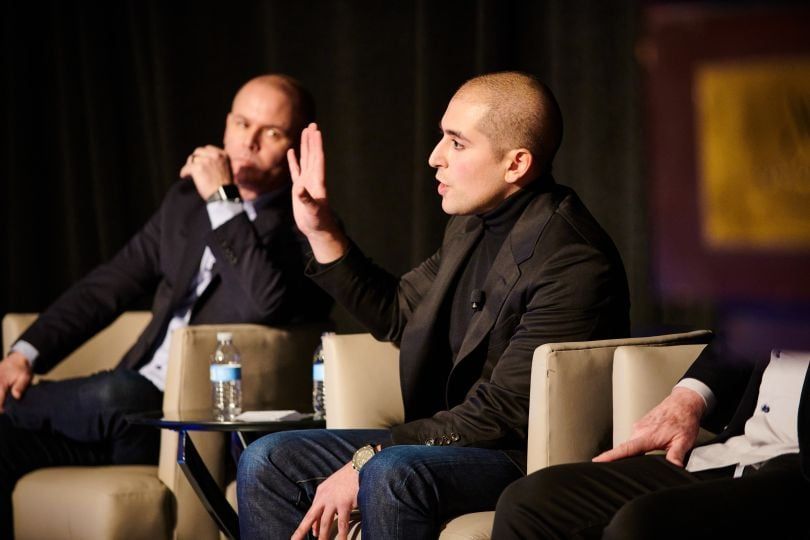
Merchants that were once resistant to offering credit cards as a payment option are likely rethinking their business strategies. In light of the coronavirus pandemic, U.S. businesses facing revenue declines or slower-than-anticipated growth might take another look at all of their available options to attract and serve customers — and as many consumers strive to preserve their liquidity, credit cards are fast becoming the payment option of choice.
What previously held some merchants back — the cost of accepting credit cards — has become an addressable problem: in most states, businesses have the option to offset these processing costs through surcharging.
The only hitch? For merchants, a compliance barrier to entry, because the regulatory overhead remains steep.
Enter, Jonathan Razi, CEO and founder of CardX.
An advocate for the surcharging model nationwide, Razi founded CardX in 2013 while studying law at Harvard and searching for an industry to disrupt. Payments, a space that can fundamentally define how a business operates, was fascinating to Razi, who’s always been interested in the intersection of technology and regulation.
When the credit card surcharging rules were introduced in 2013, allowing credit card fees to be passed onto consumers in most of the country, Razi had two theses: “I knew interchange fees were going to continue to be very costly, and I knew that businesses were not going to be able to navigate these rules on their own.”
That’s where CardX, a compliance technology company, comes in.
Allowing businesses to accept credit card payments at 0% cost, CardX provides them with automatic compliance with all of the requirements for surcharging. At the time of purchase, CardX also informs the customer of the fee amount and reminds them of the option to pay with a no-fee method. At the heart of the model, Razi said, is customer choice — a mission that only looks more prescient in the current economic climate.
CardX is currently serving 94% of the country by population — or 46 states — but Razi said they’re working to bring it to 100% by helping businesses understand “the right way” to comply with the rules. Recently, Razi worked with Oklahoma State Senator Michael Brooks to overturn a legacy ban on surcharging in the state in 2019. In addition to its current regulatory-focused initiatives, CardX is hard at work launching new products like Lightbox, an e-commerce surcharging solution for merchants that aims to make it seamless for them to accept online payments.
Built In Chicago caught up with Razi to learn how he plans to carry CardX’s compliance-first focus forward in 2020, as well as how he’s navigated leading his company through a pandemic.
In your own words, what is CardX’s mission? How does tech play a part in bringing the company’s mission to life?
I founded the company in response to new rules in the payments industry that are great for consumer choice and promote fairness, and our value proposition from day one has been guaranteeing compliance with those rules through technology.
What inspired you to found the company?
I went to law school knowing that I wanted to be in business; I wanted a legal education and, ultimately, I wanted to be an entrepreneur. I thought payments was fascinating because, for almost any business that I looked at, payments made a huge impact on their business model. I’ve always been interested in the intersection of technology and regulation, and that’s exactly the kind of opportunity I saw in the payments space when the credit card surcharging rules were introduced in 2013.
Our technology provides businesses automatic compliance with all of the requirements for surcharging.”
So, what was the opportunity you saw with credit card surcharging?
Businesses pay over $100 billion annually in card processing fees, and surcharging gives them the option to offset those costs. When the surcharging rules first came out, I had two theses: I knew interchange fees were going to continue to be very costly, and I knew that businesses were not going to be able to navigate these rules on their own. The challenge is that these rules are highly complex, and businesses can’t take advantage of them unless someone could bring down the compliance barrier to entry. I used my background in law to develop a technology-enabled compliance model, and we built that into our products at CardX.
What does “technology-enabled compliance” look like?
When we looked at the rules set by both the card brands as well as the state laws, we really wanted to give merchants a product as easy to use as a traditional payment processing experience. The only way to do that, given the steep regulatory overhead, was to build it through technology. Our technology provides businesses automatic compliance with all of the requirements for surcharging. That’s why we describe CardX as equal parts fintech and regtech: we provide a payments solution, but one of the core differentiators is its value as a regulatory solution.
So far we’ve talked about the benefit to businesses, but how does credit card surcharging affect their customers?
Consumer benefit is at the heart of our model. For many merchants, CardX enables them to accept card payments for the first time, which gives consumers more choice in how they want to pay. That includes no-fee payment options, like a debit card.
In addition, merchants who already accept card payments, in the absence of the surcharging option, often raise their prices across the board as interchange increases, which means that consumers who pay with cash and debit are paying more to subsidize someone else’s rewards. The strong benefits for both businesses and consumers alike are why surcharging is perhaps the only policy issue supported by both Elizabeth Warren and the Cato Institute.
The last few months have really shown us how important what we do is in uncertain times.”
How has your own legal training impacted your company?
My legal background has been key to our efforts advocating for the surcharging model nationwide. We were the only payments company to file an amicus brief in the U.S. Supreme Court case on surcharging, and I have always believed the regulatory leader is in a unique position to productize compliance — to take our expertise about the rules and build it into the product — and we continue to carry that compliance-first focus forward.
What was CardX’s role in filing your brief in the Supreme Court?
We were writing a brief as amicus, because we wanted to provide real-world expertise to the justices about how a surcharging solution works in practice. The rules of Supreme Court procedure say that if you’re supporting one side or another — in our case, we were supporting the petitioners — the cover and back of the printed document that you submit actually has to be a certain color. So, for us, it was green. And when I went to oral argument — this is when the case is being heard — I remember sitting there, and the Supreme Court clerks coming out with a very thin stack of green briefs, maybe 10 or 15 in total, and handing them out to all the justices. I thought that was a very defining moment for us, to see so literally how our experience was a part of that case.
What is a regulatory-focused challenge or project your team is working on right now?
We’re currently serving 94% of the country by population, and we’re working to bring it to 100% through our efforts and by helping businesses understand the right way to comply with the rules. Just last year, we initiated the process of overturning Oklahoma’s no-surcharging law by presenting it to a state senator. The result was an official opinion letter from the Oklahoma Attorney General, which opened the state to surcharging. In addition to bringing our total to 46 states, it was really personally rewarding to see CardX etched into the legal history of this matter.
How have you navigated leading your company during the coronavirus pandemic?
The health and safety of our employees is our number-one priority. While remote work has been an adjustment, I’m very proud of the level of productivity our team has kept up during these times. We actually just launched a new product — Lightbox — which is an e-commerce surcharging solution for merchants. I've heard from a lot of employers and from a lot of companies, whether they make anything from enterprise software to video games, that those things are being delayed, because it's hard to get people to launch new products when they’re working in different places and they don’t have the same ease of collaboration they’re used to. So I’m very proud that, in a challenging environment, we continue to innovate.
You mentioned launching Lightbox. Can you tell me more about that?
Sure — I think it’s a very timely launch. The last few months have really shown us how important what we do is in uncertain times. We’ve actually seen a shift in payments from debit to credit card, as many people are trying to preserve liquidity. At the same time, a lot of businesses who are facing declines in revenue or slower growth are saying, I recognize that I need to take cards, I want to extend that option to my customers, but I also need to eliminate expenses. They’re turning to us as that perfect middle path — offering the credit card option while eliminating its expense — and Lightbox makes it seamless for them to accept online payments, which is especially important right now.






